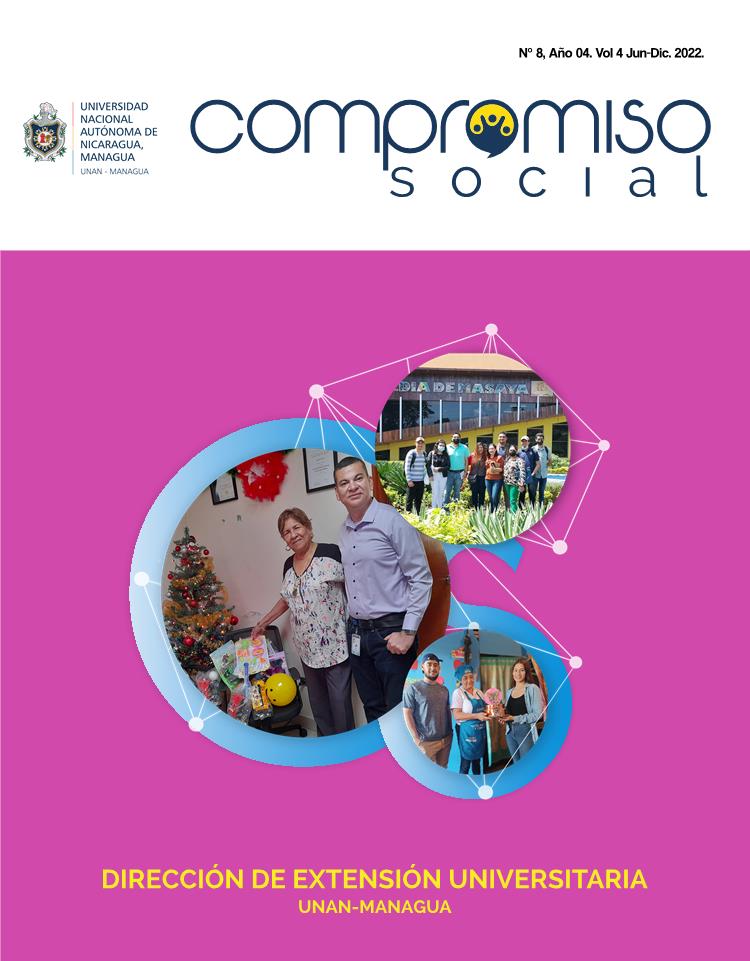The Evaluation of Knowledge Integrating Projects at UNAN -Managua
DOI:
https://doi.org/10.5377/recoso.v4i8.18610Keywords:
Knowledge Integrator Product (PIS), Curricular integration, Evaluation as a process, Guiding Base for ActionAbstract
This unique study of its kind at the university level and at the country level, refers to the experience lived by teachers and students in the process of evaluation of the Integrating Knowledge Product (PIS). The importance of the study lies in the fact that today universities in general and UNAN-Managua in particular have established the PIS as strategic instruments to train future professionals with the necessary skills to solve social problems and face uncertainty. In them the quality of the learning achieved and to be achieved is evidenced and from this, improve them. Methodologically, the work is circumscribed in the qualitative-phenomenological-descriptive paradigm in which 30 teachers and 30 students from 10 defense teams and from three different careers of the Faculty of Economic Sciences participated, providing the primary source of the study, the secondary source was It was obtained by resorting to academic Google and the indexed journals generated by the search engine, for which some Boolean resources were used to accurately manage updated and reliable information on the subject in question. The analysis of the data was made from the results obtained, the information from a secondary source and later contrasted, with respect to the theoretical basis. In the Results, it was possible to verify the advances in the curricular integration mainly in what refers to Planning and organization of the evaluation, not so in the execution, and evaluation of the process, where application weaknesses were observed, nuanced by lack of will of the teaching staff, at the same time allowed to observe the learning achieved by the students of cognitive aspects typical of the first year, through the student performance of the I and II (Both of the I semester 2022). It is concluded that greater leadership, organization, better control and evaluation by the directors of the teaching departments are necessary, before, during and after the construction process of the PIS and in general of the evaluation.
Downloads
References
Abreu, J. L. (14 de 08 de 2022). http://www.spentamexico.org/v9-n3/A17.9(3)195-204.pdf. Obtenido de http://www.spentamexico.org/v9-n3/A17.9(3)195-204.pdf.
Anijovich, R. &. (15 de 08 de 2022). https://scholar.google.es/scholar?hl=es&as_sdt=0%2C5&q=EVALUACION. Obtenido de https://scholar.google.es/scholar?hl=es&as_sdt=0%2C5&q=EVALUACION.
Cruz Martínez, A., Pérz Martínez, L. d., & Mesa Barrera, Y. (2021). metodología para la evalaución del aprendizaje a partir de proyectos integradores. Transformación, 376.
E, C. M. (1995). Metodología: Guía para elaborar diseños de investigación en Ciencias sociales, contables y administrativas. En C. M. E, Metodología: Guía para elaborar diseños de investigación en Ciencias sociales, contables y administrativas (pág. 170). Bogotá.
Fernández, A. Z. (24 de 06 de 2022). https://www.todamateria.com/investigacion-cualitativa. Obtenido de https://www.todamateria.com/investigacion-cualitativa.
Iño Webinar. Voces de la Educación. (14 de 08 de 2022). file:///C:/Users/Usuario/Downloads/Dialnet-InvestigacionEducativaDesdeUnEnfoqueCualitativo. Obtenido de file:///C:/Users/Usuario/Downloads/Dialnet-InvestigacionEducativaDesdeUnEnfoqueCualitativo.
Jarquín, P. A. (2021). Evaluación de competencias. Evaluación auténtica. Chisinau. Moldavia: Editorial Academica Española.
Letícia Sampaio Suñé, P. J. (2015). Desenho de curriculo para desenvolver competencias: una poroposta metodológica. En P. J. Letícia Sampaio Suñé, Desenho de curriculo para desenvolver competencias: una poroposta metodológica (pág. 305). Aracaju Sergripe: EDITORA UNIVERSITÁRIA TIRADENTES.
Méndez, J. Á. (21 de 07 de 2022). file:///C:/Users/Usuario/Downloads/Dialnet-ProyectoIntegradorDeSaberesEvidenciaDelResultad. Obtenido de file:///C:/Users/Usuario/Downloads/Dialnet-ProyectoIntegradorDeSaberesEvidenciaDelResultad: https://d1wqtxts1xzle7.cloudfront.net/59842774/239151136-Educar-por-competencias-Gimeno-Sacristan-pdf20190623-45487-ilfnaa-with-cover-page-v2.pdf?Expires=1666720066&Signature=et88sBE7Shrl0rK4XqrUONXwKa-14Dk3-iRJuynsuPD1ZEdaWRcgSxqZqAHDwa56yPfNtxJ13hXc81Zv
Quiñonez, V. H. (2018). Proyecto integrados de saberes, evidencia del resultado de aprendizaje. INNOVA, 94.• Roberto, D. A. (24 de 07 de 2022). https://www.researchgate.net/publication/282092030_Desenho_de_curriculo_para_desenvolver_competencias.Obtenido de https://www.researchgate.net/publication/282092030_Desenho_de_curriculo_para_desenvolver_competencias.
Rodríguez Borge, C. G., Bowen Quiroz, C. A., Pérez Rodríguez, J. A., & Rodríguez Gámez, M. (2020). Evaluación de las capacidades de aprendizaje colaborativo adquiridas mediante el PIS. Formación Universitaria, 246.
SACRISTÁN, J. G. (21 de 07 de 2008). Evaluar el aprendizaje en una enseñanza centrada en las competencias. Dialnet, 223. Obtenido de file:///C:/Users/Usuario/Downloads/Dialnet-ProyectoIntegradorDeSaberesEvidenciaDelResultad. (21 de 07 de 2022). Obtenido de file:///C:/Users/Usuario/Downloads/Dialnet-ProyectoIntegradorDeSaberesEvidenciaDelResultad.
UNAN-Managua. Docencia de Grado. (2021). Diseño Curricular para desarrollar competencias en la UNAN-Managua. En D. d. Grado, Diseño Curricular para desarrollar competencias en la UNAN-Managua. (pág. 32). Managua: Editorial Universitaria.
Vásquez Cano, E. (15 de 08 de 2022). https://redined.educacion.gob.es/xmlui/bitstream/handle/. Obtenido de https://redined.educacion.gob.es/xmlui/bitstream/handle/.
Vélez, C. M. (2021). Aporte de los 7 saberes de Edgar Morín en la educación superior en el Ecuador. Dominio de las Ciencias, 332.Pág. 73-86Pedro
Downloads
Published
Issue
Section
License
Copyright (c) 2022 Universidad Nacional Autónoma de Nicaragua, Managua(UNAN-Managua)

This work is licensed under a Creative Commons Attribution-NonCommercial-ShareAlike 4.0 International License.




